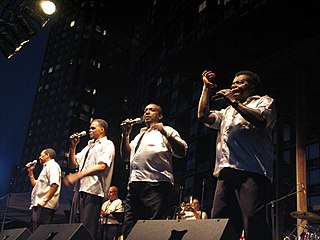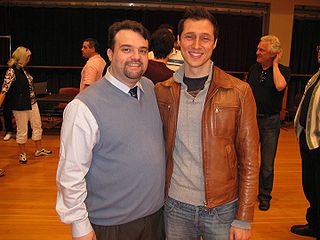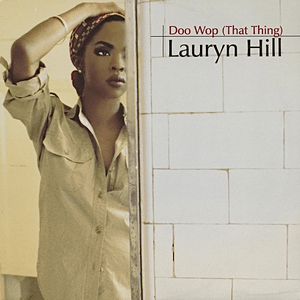
Doo-wop is a subgenre of rhythm and blues music that originated in African-American communities during the 1940s, mainly in the large cities of the United States, including New York, Philadelphia, Pittsburgh, Chicago, Baltimore, Newark, Detroit, Washington, D.C., and Los Angeles. It features vocal group harmony that carries an engaging melodic line to a simple beat with little or no instrumentation. Lyrics are simple, usually about love, sung by a lead vocal over background vocals, and often featuring, in the bridge, a melodramatically heartfelt recitative addressed to the beloved. Harmonic singing of nonsense syllables is a common characteristic of these songs. Gaining popularity in the 1950s, doo-wop was "artistically and commercially viable" until the early 1960s and continued to influence performers in other genres.
Eamon Doyle, known mononymously as Eamon, is an American singer and songwriter. He is mainly known for his 2003 hit single "Fuck It ".
Oldies is a term for musical genres such as pop music, rock and roll, doo-wop, surf music, broadly characterized as classic rock and pop rock, from the second half of the 20th century, specifically from around the mid-1950s to the 1980s, as well as for a radio format playing this music.

Cruising with Ruben & the Jets is the fourth album by the Mothers of Invention, and fifth overall by Frank Zappa, released under the alias Ruben and the Jets. Released on December 2, 1968 on Bizarre and Verve Records with distribution by MGM Records, it is a concept album, influenced by 1950s doo-wop and rock and roll. The album's concept deals with a fictitious Chicano doo-wop band called Ruben & the Jets, represented by the cover illustration by Cal Schenkel, which depicts the Mothers of Invention as anthropomorphic dogs. It was conceived as part of a project called No Commercial Potential, which produced three other albums: Lumpy Gravy, We're Only in It for the Money and Uncle Meat.

Little Anthony and the Imperials is an American rhythm and blues/soul vocal group from New York City founded by Clarence Collins in the 1950s and named in part for its lead singer, Jerome Anthony "Little Anthony" Gourdine, who was noted for his high-pitched voice. In addition to Collins and Gourdine, the original Imperials included Ernest Wright, Gloster "Nate" Rogers, and Tracy Lord, the last two of whom were subsequently replaced by Sammy Strain.
Doo Wop 50 is a television and DVD special created and produced by TJ Lubinsky, grandson of Herman Lubinsky. The special was inspired by a 1994 CD box-set of doo wop music which was also a development and production partner WQED in the program and dvd. It aired in December 1999.

Terry James Lubinsky is an American television, radio and digital media host. He is also creator, executive producer and director of many Public Broadcasting Service pledge-drive programs. He presents oldies-format music programs airing on PBS to tell the stories behind the "songs of yesteryear".
Flamingo is the common name for birds in the genus Phoenicopterus.

"Tutti Frutti" is a song written by Little Richard and Dorothy LaBostrie, recorded in 1955, which was his first major hit. With its energetic refrain, often transcribed as "A-wop-bop-a-loo-mop-a-lop-bam-boom!", and its hard-driving sound and wild lyrics, it became not only a model for many future Little Richard songs, but also for rock and roll itself. The song introduced several of rock music's most characteristic musical features, including its loud volume, powerful vocal style, and distinctive beat and rhythm.
Ruben and the Jets was an American rock and roll band from Los Angeles, California. The band originated as an alias for The Mothers of Invention, Frank Zappa's band, to release Cruising with Ruben & the Jets (1968). Later, musician Rubén Guevara Jr. continued the band with his own lineup. Guevara's "Jets" recorded two albums, For Real! (1973) and Con Safos (1974).

"Doo Wop (That Thing)" is a song by American rapper and singer Lauryn Hill from her debut solo studio album, The Miseducation of Lauryn Hill (1998). It was written and produced by Hill. The song was released as her solo debut and lead single from The Miseducation of Lauryn Hill on August 10, 1998, by Ruffhouse Records and Columbia Records. No commercial release was originally intended for the single in the US, but limited-quantity physical formats were issued two months later, on October 27.

"In the Still of the Nite", also subsequently titled "In the Still of the Night", is a song written by Fred Parris and recorded by his band the Five Satins. Originally the song was titled "(I'll Remember) In the Still of the Nite" to distinguish itself from Cole Porter's "In the Still of the Night". Later the title was changed to "In the Still of the Night".

"Gee" is a song by American R&B and doo-wop group the Crows, released in June 1953. The song has been credited as the first rock and roll hit by a rock and roll group. It is a doo-wop song, written by William Davis and Viola Watkins, and recorded by the Crows on the independent label, Rama Records, at Beltone Studios in New York City in February 1953. It charted in April 1954, one year later. It took a year to get recognized on Your Hit Parade. It landed No. 2 on the rhythm and blues chart and No. 14 on the pop chart. It was the first 1950s doo-wop record to sell over one million records. Recorded on an independent label, it was one of the first such R&B records to crossover to the wider pop market. Some, including Jay Warner, consider it as the first of the "rock and roll records".
Charade or charades may refer to:

Vocal harmony is a style of vocal music in which a consonant note or notes are simultaneously sung as a main melody in a predominantly homophonic texture. Vocal harmonies are used in many subgenres of European art music, including Classical choral music and opera and in the popular styles from many Western cultures ranging from folk songs and musical theater pieces to rock ballads. In the simplest style of vocal harmony, the main vocal melody is supported by a single backup vocal line, either at a pitch which is above or below the main vocal line, often in thirds or sixths which fit in with the chord progression used in the song. In more complex vocal harmony arrangements, different backup singers may sing two or even three other notes at the same time as each of the main melody notes, mostly with a consonant, pleasing-sounding thirds, sixths, and fifths.

The Earth Angels are a Spanish doo-wop vocal group from Barcelona, Catalonia which performs a cappella music. On tour, they also sing on city streets. The group formed in 2007, when bass-baritone Christian Carrasco announced that he was looking for a doo-wop singer and found lead vocalist Jordi Majó.

Doo-Wops & Hooligans is the debut studio album by American singer-songwriter Bruno Mars. It was released on October 4, 2010, by Atlantic and Elektra Records and was made available to listen before its official release on September 24, 2010. After the release of the EP It's Better If You Don't Understand, Mars's writing and production team, the Smeezingtons, began working on the album with Needlz, Supa Dups and Jeff Bhasker as producers. The album title was chosen to reflect simplicity and appeal to both males and females.

"The Lazy Song" is a song by American singer-songwriter Bruno Mars for his debut studio album, Doo-Wops & Hooligans (2010). It was serviced to contemporary hit radios in the United States on February 15, 2011, as the album's third single by Atlantic and Elektra. Development of "The Lazy Song" began while Mars, Philip Lawrence and Ari Levine were hanging around the studio and didn't feel like working. The trio produced the track under their alias, the Smeezingtons, and wrote the song in collaboration with rapper K'naan. Musically, "The Lazy Song" has been described as borrowing "heavily from roots reggae" and has been compared to the reggae style of Jason Mraz, while lyrically it is an anthem to laziness.
"Marry You" is a song by American singer and songwriter Bruno Mars from his debut studio album, Doo-Wops & Hooligans (2010). Written and produced by the Smeezingtons, it serves as the record's sixth track and was released as a single outside of the United States. "Marry You" is a pop, doo-wop and soul song. The recording focuses on spontaneous marriage and therefore, since its release, has frequently been used as a proposal song. "Marry You" received generally positive reviews from music critics, with some complimenting its production and its reminiscence of 1960s pop style. Some criticized a perceived lack of creativity.
"Talking to the Moon" is a song by American singer-songwriter Bruno Mars from his debut studio album, Doo-Wops & Hooligans (2010). The song was first unveiled on Mars's debut extended play, It's Better If You Don't Understand (2010), as its last track. It was written by Mars, Philip Lawrence, Ari Levine, Albert Winkler, and Jeff Bhasker, while production was handled by the Smeezingtons in collaboration with Bhasker. "Talking to the Moon" is a pop and R&B power ballad about a failed relationship, solitude, and sadness. Instrumentally, the track relies on drum percussion and piano.











